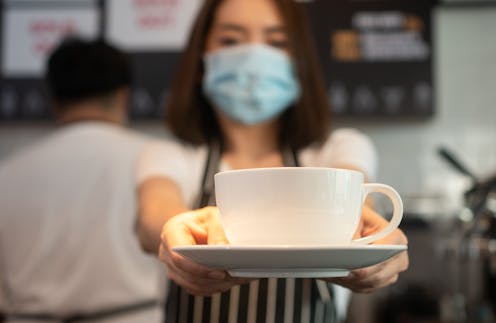why working from home leaves the lowest paid at more risk of infection
- Written by Helen Collins, Senior Lecturer in Human Resource Management, Liverpool John Moores University

The latest directive from the UK government that people should work from home[1] has led to concerns about the impact on businesses[2] in the run up to Christmas.
But it is also likely to have a devastating effect on people on low pay who may be unable to work from home. The same is true of new rules requiring people to self-isolate for ten days[3] after being in contact with someone infected with the omicron variant.
For those with limited access to sick pay or who are unable to work from home, both measures could lead to a rise in “sickness presenteeism” – going to work when you are ill. The risk of this happening should not be ignored as governments attempt to deal with the new COVID strain.
Recent research[4] has shown that people in low paid, insecure and self-employed roles are driven by financial necessity to presenteeism. This then spreads disease, shown in separate research which highlights the disproportionate COVID rates[5] in low paid, manual and frontline workers.
Many of these people cannot rely on statutory sick pay, which is set in the UK at £96 per week (among the least generous levels in Europe[6]), so they have no choice but to turn up to work.
Around 1.8 million employees do not qualify for sick pay because they don’t earn enough, and 5 million miss out because they are self-employed[7]. Many immigrants also are ineligible, and while the government offers a payment of £500 to cover a period of self-isolation, for the many thousands of workers without a contract, this is difficult to access. Recent analysis[8] highlighted that over 500,000 seasonal workers employed over the festive season in the UK will not qualify for statutory sick pay.
So while the government urges people to work from home in an effort to limit the spread of omicron, there is also an urgent need to deter contagious presenteeism.
As the director-general of the World Health Organization said last year[9]: “With decisive, early action, we can slow down the virus and prevent infections”. But what does decisive action mean to a worker on a very low income with no access to benefits that others take for granted?
One obvious step would be to drastically improve access to sick pay, allowing people to take time off without leaving themselves in dire financial straits.
In the US for example, the introduction in April 2020 of legislation[11] in response to COVID which allowed for two weeks of paid sick leave, led to a reduction of nearly 50% in the number of daily COVID infections[12].
Even in a world without COVID, the consequences of working while ill appear obvious, and research on presenteeism highlights the effects it can have. It grinds down the sick worker, making symptoms worse and increasing the chance of future health problems[13].
Evidence from a number[14] of studies[15] also shows that presenteeism is a significant predictor of long-term absenteeism, posing a risk to both immediate and future productivity.
The health of co-workers could also be harmed, and their work load increased by an ill person’s reduced output. Beyond the workplace, presenteeism creates tensions at home and leads to a poorer quality of life[16] for the whole family.
More broadly, the impact of presenteeism extends beyond[17] the employee’s own health, to the organisation, and the wider economy. And although it may seem harder to address than absenteeism (not showing up for work), it is equally as important and worthy of the same attention[18].
Help for the most vulnerable needs to be more widely available and easier to access. Organisations which employ agency workers, should improve transparency around terms and conditions, and be more accountable for presenteeism when it occurs.
And trade unions, who have done very little[19] to encourage unionisation of precarious workers, should demand more protection. It is at times like these when they – and society as a whole – need it most.
References
- ^ should work from home (www.independent.co.uk)
- ^ impact on businesses (www.bbc.co.uk)
- ^ self-isolate for ten days (www.bbc.co.uk)
- ^ Recent research (pubmed.ncbi.nlm.nih.gov)
- ^ disproportionate COVID rates (www.bmj.com)
- ^ least generous levels in Europe (journals.sagepub.com)
- ^ because they are self-employed (ifs.org.uk)
- ^ Recent analysis (www.tuc.org.uk)
- ^ said last year (www.who.int)
- ^ Shutterstock/KornT (www.shutterstock.com)
- ^ legislation (www.dol.gov)
- ^ number of daily COVID infections (doi.org)
- ^ future health problems (pubmed.ncbi.nlm.nih.gov)
- ^ a number (rdcu.be)
- ^ of studies (doi.org)
- ^ poorer quality of life (pubmed.ncbi.nlm.nih.gov)
- ^ extends beyond (www.jstor.org)
- ^ worthy of the same attention (doi.org)
- ^ done very little (doi.org)







